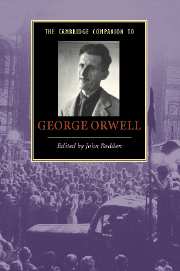Book contents
- Frontmatter
- 1 A political writer
- 2 Orwell and the biographers
- 3 Englands His Englands
- 4 The truths of experience: Orwell’s nonfiction of the 1930s
- 5 The fictional realist: novels of the 1930s
- 6 Orwell’s essays as a literary experience
- 7 ‘My country, right or left’: Orwell’s patriotism
- 8 Orwell and the British Left
- 9 Orwell, anti-Semitism and the Holocaust
- 10 Orwell, Socialism and the Cold War
- 11 Animal Farm: history as fable
- 12 Nineteen Eighty-Four: context and controversy
- 13 Orwell, the academy and the intellectuals
- 14 Orwell for today’s reader: an open letter
- 15 George Orwell: a bibliographic essay
- 16 Why Orwell still matters
- Further reading
- Index
3 - Englands His Englands
Published online by Cambridge University Press: 28 July 2007
- Frontmatter
- 1 A political writer
- 2 Orwell and the biographers
- 3 Englands His Englands
- 4 The truths of experience: Orwell’s nonfiction of the 1930s
- 5 The fictional realist: novels of the 1930s
- 6 Orwell’s essays as a literary experience
- 7 ‘My country, right or left’: Orwell’s patriotism
- 8 Orwell and the British Left
- 9 Orwell, anti-Semitism and the Holocaust
- 10 Orwell, Socialism and the Cold War
- 11 Animal Farm: history as fable
- 12 Nineteen Eighty-Four: context and controversy
- 13 Orwell, the academy and the intellectuals
- 14 Orwell for today’s reader: an open letter
- 15 George Orwell: a bibliographic essay
- 16 Why Orwell still matters
- Further reading
- Index
Summary
To say that England made George Orwell is both true and far more complicated than it seems. After all, there is, and always has been, more than one England. In the first half of the twentieth century there were Englands of the left and of the right; a hopeful and idealistic England and a depressingly pessimistic England. There was an England of law and liberty, and (especially in wartime) an England infected by strains of totalitarianism. Of course the nation was riven by class, but Disraeli's 'Two Nations' had by now divided into several new subgroups: the old working class (for instance) had split between those who enjoyed some of the trappings of mass affluence and those mired in permanent unemployment.
Orwell knew all of these Englands, perhaps better than any other author of his generation. His contemporaries tended to focus on particular social niches, with middlebrow writers writing about Middle England, proletarian writers concentrating on proles, and Bloomsbury intellectuals telling all you need to know about Bloomsbury. But Orwell had a genius for ranging across the boundaries of class, culture, ideology and literary fiefdoms. He was a sociologist of remarkable breadth, and his writings, taken together, may offer the most comprehensive profile of modern English society ever produced by one individual. He was able to explore and explain all of the many coexisting Englands, because he half-belonged to each of them.
- Type
- Chapter
- Information
- The Cambridge Companion to George Orwell , pp. 28 - 42Publisher: Cambridge University PressPrint publication year: 2007
- 2
- Cited by

